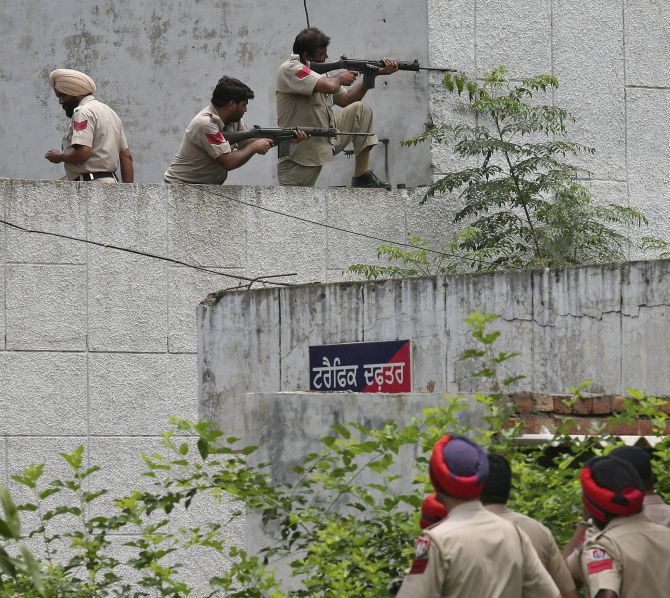prasad1
Active member
'India's policy makers need to pull their heads out of the sand and recognize the reality that Pakistan has supported and sponsored terrorism on Indian soil for more than three decades; a national counter-terrorism strategy must be evolved in the fullest consciousness of this fact, and of the continued hostility of the Pakistani nation-State to the very idea of India,' says Ajai Sahni.

No conclusive identification of the terrorists involved in the protracted stand-off at the Dinanagar police station, Gurdaspur district, Punjab, has yet been made.
Punjab Director General of Police Sumedh Saini has confirmed that three terrorists were involved in the operation, and all three were killed at the end of a 10-hour confrontation.
Three Home Guards, Superintendent of Police Baljeet Singh, and three civilians were killed in the attack. According to initial disclosures, the terrorists had GPS devices, were heavily armed and highly motivated, reinforcing initial suspicions that this was a fidayeen attack, most likely launched from Pakistan.
Most questions of affiliation, motive and intent are likely to remain in the realm of speculation, since none of the attackers survived.
Intelligence sources had initially indicated that the terrorists had entered Indian territory in the Hiranagar sector in Jammu, taking advantage of a rain swollen canal, from Narowal in the Pakistani province of Punjab. Five bombs were also recovered from the Amritsar-Pathankot railway track, and were defused.
While the army was sent in for support and assisted in defusing some bombs at the Dinanagar police station campus as well, the principal operation was executed by the Punjab police. Following a tradition established by K P S Gill of leading from the front, DGP Saini personally oversaw the operation at the police station.
It is significant that Khalistani terrorist formations, who had devastated the state for over 13 years between 1980 and 1993, and whose top surviving leadership and some cadres continue to be hosted by the Pakistani Inter Services Intelligence on Pakistani soil, have not been particularly active in Punjab since 1995 and have, at worst, engaged in occasional acts of soft-target terrorism -- leaving bombs in public places -- at least since 1995.
The fidayeen pattern of attack -- suicidal cadres engaging in protracted confrontations with armed forces -- has been characteristic of Pakistan-backed Islamist terrorists operating in Jammu and Kashmir.
http://www.rediff.com/news/column/ajai-sahni-end-this-charade-of-talking-to-pakistan/20150729.htm
Does it matter that Government of India is talking to a failed state of Pakistan?

No conclusive identification of the terrorists involved in the protracted stand-off at the Dinanagar police station, Gurdaspur district, Punjab, has yet been made.
Punjab Director General of Police Sumedh Saini has confirmed that three terrorists were involved in the operation, and all three were killed at the end of a 10-hour confrontation.
Three Home Guards, Superintendent of Police Baljeet Singh, and three civilians were killed in the attack. According to initial disclosures, the terrorists had GPS devices, were heavily armed and highly motivated, reinforcing initial suspicions that this was a fidayeen attack, most likely launched from Pakistan.
Most questions of affiliation, motive and intent are likely to remain in the realm of speculation, since none of the attackers survived.
Intelligence sources had initially indicated that the terrorists had entered Indian territory in the Hiranagar sector in Jammu, taking advantage of a rain swollen canal, from Narowal in the Pakistani province of Punjab. Five bombs were also recovered from the Amritsar-Pathankot railway track, and were defused.
While the army was sent in for support and assisted in defusing some bombs at the Dinanagar police station campus as well, the principal operation was executed by the Punjab police. Following a tradition established by K P S Gill of leading from the front, DGP Saini personally oversaw the operation at the police station.
It is significant that Khalistani terrorist formations, who had devastated the state for over 13 years between 1980 and 1993, and whose top surviving leadership and some cadres continue to be hosted by the Pakistani Inter Services Intelligence on Pakistani soil, have not been particularly active in Punjab since 1995 and have, at worst, engaged in occasional acts of soft-target terrorism -- leaving bombs in public places -- at least since 1995.
The fidayeen pattern of attack -- suicidal cadres engaging in protracted confrontations with armed forces -- has been characteristic of Pakistan-backed Islamist terrorists operating in Jammu and Kashmir.
http://www.rediff.com/news/column/ajai-sahni-end-this-charade-of-talking-to-pakistan/20150729.htm
Does it matter that Government of India is talking to a failed state of Pakistan?
